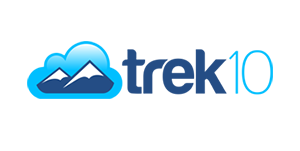
Trek10 was founded in 2013 by Andrew Warzon, Jim Abercrombie and Shane Fimbel. At the highest level Trek10 is a cloud management and consultancy startup. The core element of Trek10’s business is Amazon Web Services -- often referred to as AWS. Amazon Web Services, a subsidiary of Amazon.com, is unquestionably the market leader in cloud based infrastructure and platform as a service. Infrastructure as a service (IaaS) is the delivery of third-party managed computational hardware, in this case servers, to end users. Platform as a service (PaaS) is similar to IaaS. However, PaaS providers manage application critical software allowing users to run their applications with minimal overheads.
AWS’s market is valued at roughly $150 billion and is projected to grow at a rate of roughly 16% year on year. AWS currently holds approximately one third of this huge market. What Amazon offers is a portfolio of 50+ web based tools and services capable of high performance completion or automation of countless IT tasks. AWS offers a number of web based products from mobile device simulation to virtualized servers to business intelligence and analytics. In the digital era of business there are very few business cases where at least one AWS product is not applicable.
Trek10 are expert AWS resellers specializing in all things AWS. Trek10 offer clients comprehensive support, hands on development and a growing range of management tools to insure optimal utilization of AWS’ many industry leading products. In fact, Trek10 often goes above and beyond the call of duty and gets hands-on with development of client projects.
At present, Trek10 is placing considerable focus on the latest and greatest from AWS. Trek10 aims to carve out a niche in the market by insuring early movement on the most innovative market trends. The two cloud computing paradigms that are drawing the most attention from Trek10 are event-driven computing and container-based computational architectures. Event driven computing, as the name suggests, is the execution of code in response to some digital event. An example could be the execution of code to log keywords in response to a tweet. There are several major advantages of event driven computing. In the case of AWS’s event driven computing engine Lambda, the user is only charged when the code is running and the charge is exceptionally small, fractions of cents per invocation. Container based computational architectures are somewhat more esoteric for laymen, but suffice to say, the paradigm is a considerable change of pace from the typical virtual server approach used by cloud vendors. Trek10’s latest software development project codename “Harbour Dock” focuses heavily on both container based computational architecture and event driven computing.

Harbour Dock is being developed as a management platform for the AWS product known as the “EC2 container service” (ECS). ECS, in simple terms, is a tool for deploying and managing groups of containers onto AWS virtual servers. For most clients of Trek10, this level of detail is an unnecessary headache, as it perhaps is for you. Trek10 is developing Harbour Dock with the intention of making the running of applications built on ECS as simple as possible. Harbour Dock takes advantage of a new “serverless” framework which relies heavily on event-driven computing through Lambda. Harbour Dock combines the speed and extensibility of ECS with the massive flexibility, availability, stability and cost saving of creating applications using AWS Lambda. If you found yourself lost in the myriad of acronyms and jargon fear not, Harbour Dock will offer a simple to use point and click graphical interface, abstracting away layers of complexity.
My thesis focuses on the commercialization of Harbour Dock. Given my background in computer engineering and cloud-related research experience, Trek10 is an ideal thesis sponsor. Presently, Harbour Dock is being built by combining numerous AWS products and a number of related open-source software tools. I am uniquely positioned to contribute to the development of Harbour Dock not only through code base development but, potentially in a more meaningful manner through extensive market research and analysis. Harbour Dock is not a revenue critical product for Trek10. However, it has the potential tp develop Trek10’s expert brand, attract clients, establish development community reputation and encourage potentially lucrative partnerships.